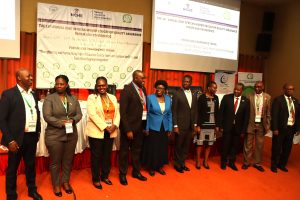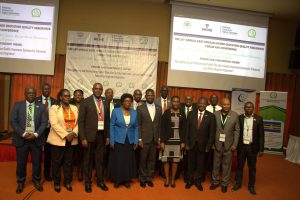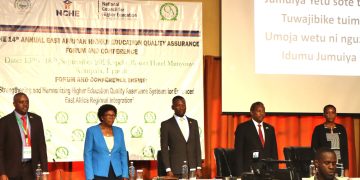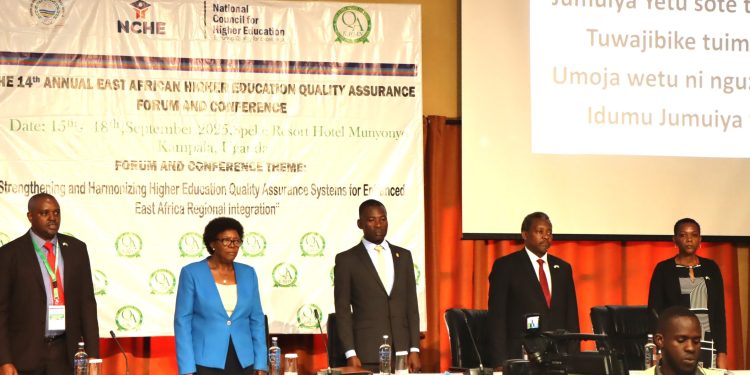Munyonyo — Uganda on Monday officially opened the 14th Annual East African Higher Education Quality Assurance (EAQAN) Forum and Conference, a gathering of chancellors, vice chancellors, policymakers, and higher education experts from across the region.
Organised by the National Council for Higher Education (NCHE) at Speke Resort Hotel Munyonyo, the forum brings together East African and international stakeholders to harmonise and strengthen higher education quality and regional collaboration.
The guest of honour, Hon. Dr. John Chrysestom Muyingo, Minister of State for Higher Education, in his speech, read by Hon. James Kubeketerya, chair of the Committee on Education and Sports, emphasised the central role of higher education in regional integration.
“Education, and specifically higher education, is the glue that cements countries and regions together,” he said. “For higher education to achieve this responsibility, it must be of high quality. Quality education does not just happen; it requires meticulous planning and effective execution.”
Hon. Muyingo highlighted the importance of harmonising quality assurance systems across East Africa. “Harmonisation facilitates the recognition of qualifications across borders, promotes academic mobility, and enhances the employability of our graduates in the regional job market,” he said.
He also urged forum participants to engage with local communities during their stay to make integration a lived reality, not just an academic discourse. “If each of you from outside Uganda could meet and make friends with one Ugandan citizen beyond the confines of this forum, that would breathe life into the regional integration discourse,” he said.
Professor Mary J.N. Okwakol, Executive Director of Uganda’s National Council for Higher Education (NCHE), linked the forum to the recent East African Community (EAC) Ministerial Conference on the East African Higher Education Area, which reaffirmed the importance of harmonised qualifications frameworks, cross-border mobility, and the central role of quality assurance agencies.

She emphasised the strategic relevance of harmonising higher education standards across the region. “Our collective commitment to quality, relevance, and harmonisation in higher education is key to mutual recognition of qualifications, academic mobility, and global competitiveness of our graduates and research outputs,” she said.
She also outlined NCHE’s ongoing initiatives to strengthen Uganda’s Higher Education Qualifications Framework, integrate technology and AI in quality assurance, and advance competence-based curricula. “These actions complement IUCEA and EAQAN’s regional initiatives and directly implement the resolutions of the recent Ministerial Conference,” she said.
Professor Paul Muoki Nzioki, President of EAQAN, applauded Uganda and regional institutions for their commitment to higher education excellence. “It is clear that Uganda has grown into a vibrant platform for collaboration, leadership, and policy-making in higher education,” he said.
Professor Nzioki highlighted the forum’s three key discussion themes: competence-based education, internal and external quality assurance policies, and harmonisation of East African higher education.
He underscored the region’s education challenges, noting that only 9% of East Africans are enrolled in higher education, compared to a global rate of 38%. “This forum is a call for action—to innovate, collaborate, and advance a shared vision of excellence in higher education,” he said.
International partners also participated in the opening. Dr. Dorothee Weyler, Regional Director of the German Academic Exchange Service (DAAD), noted DAAD’s long-standing support for regional quality assurance initiatives. “DAAD is proudly associated with the East African Higher Education Quality Assurance Network, providing capacity-building, workshops, and partnerships to strengthen universities in the region,” she said.

Dr. Weyler, who was represented by Margaret Kirai, who is the Deputy Director and Head of Finance and Administration at the DAAD Regional Office for Africa in Nairobi, Kenya, highlighted successful programs such as the Tanzanian Centre for Excellence in Legal Studies, which equips students from across the region with specialised skills in East African regional law.
Professor Gaspard Banyankimbona, Executive Secretary of the Inter-University Council for East Africa (IUCEA), praised the leadership of EAQAN and its outgoing executive secretary, emphasising the network’s role in advancing the East African Common Higher Education Area. “This network has emerged as the region’s most powerful engine for harmonised higher education, driving mutual recognition, academic mobility, and global competitiveness,” he said.
He highlighted the pivotal role of EAQAN in advancing harmonised higher education across East Africa, emphasising the network’s achievements over the years. “This network has emerged as the region’s most powerful engine for harmonised higher education, driving mutual recognition, academic mobility, and global competitiveness,” he said, urging continued collaboration among member states.
The forum will run from September 15–18, featuring keynote addresses, research presentations, capacity-building workshops, and policy dialogues. Discussions will focus on advancing competence-based curricula, integrating technology and AI into quality assurance practices, and implementing the outcomes of the recent EAC Ministerial Conference on the East African Higher Education Area.









